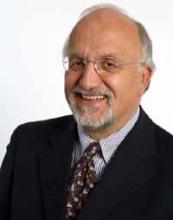Karl Ulrich Mayer
Stanley B. Resor Professor of Sociology
 Uli Mayer, B.A. University of Tübingen, Gonzaga University; M.A. Fordham University; doctoral degree at the University of Konstanz, Habilitation at the University of Mannheim, and faculty member at Yale since 2003: You have won international acclaim for your contributions to the study of human development, social mobility, and education. To highlight just two of your many contributions: you proposed a theoretical framework that integrated the study of institutions and social change with the study of human development in what became the sociology of the life course. Beyond that, you also developed and advanced methodologies that allowed rigorous formal testing of your theoretical discoveries.
Uli Mayer, B.A. University of Tübingen, Gonzaga University; M.A. Fordham University; doctoral degree at the University of Konstanz, Habilitation at the University of Mannheim, and faculty member at Yale since 2003: You have won international acclaim for your contributions to the study of human development, social mobility, and education. To highlight just two of your many contributions: you proposed a theoretical framework that integrated the study of institutions and social change with the study of human development in what became the sociology of the life course. Beyond that, you also developed and advanced methodologies that allowed rigorous formal testing of your theoretical discoveries.
Your work has been, and is to this day, enormously influential. You have trained numerous sociologists, in Europe and across the world, who contribute to a vigorous scientific sociology. Among honors that are too numerous to list here, you are a member of the European Academy of Sciences, the German Academy of Natural Sciences and of the Berlin-Brandenburg Academy of Sciences, a Corresponding Fellow of the British Academy, a Founding Member of the European Academy of Sociology, a Member of the American Academy of Arts and Sciences and the 1999 recipient of the Distinguished Scholar Award from the American Sociological Association Section on Aging and the Life Course.
Aside from your contributions to your discipline, people are always asking you to take leadership roles—and many on this faculty would like to know how you do this with such success while keeping a large research agenda moving forward. You held positions at the Universities of Frankfurt/Main and Mannheim and you were Director of the German National Survey Research Center (ZUMA). From 1993 to 1999 you served as member and Vice-Chair of the German National Science Council.
At Yale, you only have to look at the department today to see what it has continued to accomplish under your leadership: the recruitment of some of the best junior faculty and graduate students on the market is just the most visible way in which you have consolidated and expanded on what Ivan Szelenyi, and later Jeff Alexander, had begun.
Before coming to Yale you spent more than twenty years as Director at the Max Planck Institute for Human Development in Berlin. Now as you retire from Yale, you will undertake yet another major administrative role as president of the Leibniz Association, where you will face the difficult challenge of restructuring the way in which German science is accomplished, funded and evaluated. As you leave America for a distinguished position in Europe, where your work in the service of German science will actually be work in the service of all science everywhere, your colleagues at Yale salute you and wish you Viel Glück!
Tribute Editor: Penelope Laurans